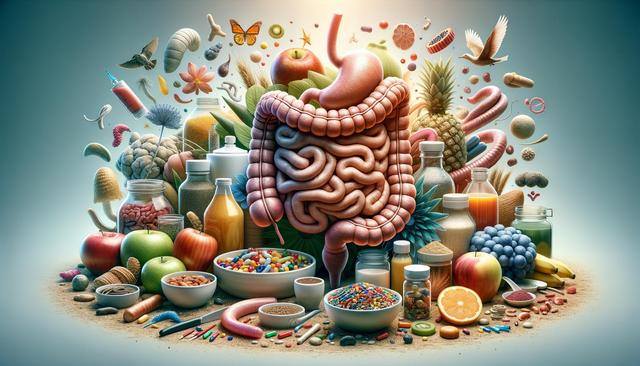
Digestive health: bloating, constipation, food intolerances, gut bacteria, natural aids, and digestion-friendly habits
Understanding Common Digestive Concerns
Many people experience digestive discomfort at some point, with bloating, constipation, and food intolerances ranking among the most frequent complaints. These symptoms may result from various factors, including diet, stress levels, and underlying health conditions. Bloating often occurs due to excess gas production or disturbances in the movement of the muscles of the digestive system. Constipation, characterized by infrequent or difficult bowel movements, can be caused by inadequate fiber intake, dehydration, or a sedentary lifestyle. Food intolerances, such as lactose or gluten intolerance, can also lead to digestive distress when certain foods aren’t properly broken down and absorbed.
Addressing these concerns requires a combination of dietary changes and supportive habits. For example, identifying and avoiding trigger foods, increasing water intake, and incorporating more fiber-rich foods can significantly reduce symptoms. Keeping a food diary may help recognize patterns and isolate foods that contribute to discomfort. Consultation with a healthcare provider is recommended when symptoms persist, as they may signal more serious underlying issues.
The Role of Gut Bacteria
Gut bacteria, also known as the gut microbiota, play a pivotal role in maintaining digestive health. These trillions of microorganisms assist in breaking down food, synthesizing vitamins, and protecting against harmful pathogens. A balanced gut microbiome contributes to efficient digestion and can even influence mood and cognitive function through the gut-brain axis.
Several factors affect the diversity and balance of gut bacteria, including diet, antibiotic use, and lifestyle habits. A diet rich in plant-based foods supports a thriving microbiome. Foods that are particularly beneficial include:
- Fermented items like yogurt, kefir, and sauerkraut
- Prebiotic-rich foods such as garlic, onions, and bananas
- Whole grains, legumes, and vegetables
Introducing probiotic supplements may also help restore gut flora, especially after a course of antibiotics. However, it’s important to choose products with scientifically supported strains and consult with a health professional before use.
Natural Aids for Digestion
Various natural aids can support digestion and alleviate discomfort. Herbal teas, such as peppermint, ginger, and chamomile, are widely recognized for their soothing properties. These herbs may help reduce bloating and ease muscle spasms in the gastrointestinal tract. Digestive enzymes, available in food or supplement form, can also enhance the breakdown of nutrients, particularly for individuals with enzyme deficiencies.
Other natural aids include:
- Aloe vera juice, known for its gentle laxative effect and soothing properties
- Apple cider vinegar, often diluted and consumed before meals to stimulate stomach acid production
- Fennel seeds, which may help relieve gas and bloating
While these remedies can offer relief, they should complement rather than replace a balanced diet and healthy lifestyle. It’s essential to monitor how your body responds and consult a healthcare provider if symptoms persist or worsen.
Developing Digestion-Friendly Habits
Beyond diet, everyday habits significantly impact digestive health. Simple changes in daily routines can yield meaningful improvements. For example, eating slowly and chewing food thoroughly supports the mechanical breakdown of food and triggers the release of digestive enzymes. Similarly, regular physical activity promotes bowel movement and reduces the risk of constipation.
Some key habits to support digestion include:
- Maintaining consistent meal times to regulate digestive rhythms
- Staying hydrated throughout the day with water and herbal teas
- Managing stress through mindfulness, yoga, or deep-breathing exercises
- Getting adequate sleep to support the body’s repair and regulatory functions
These practices not only improve digestion but also contribute to overall physical and mental health. Implementing small, consistent changes often proves more sustainable than drastic overhauls.
When to Seek Professional Guidance
While many digestive issues can be managed with lifestyle adjustments, some symptoms may indicate more serious conditions. Persistent abdominal pain, unexplained weight loss, blood in stool, or prolonged changes in bowel habits warrant medical attention. Conditions such as irritable bowel syndrome (IBS), inflammatory bowel disease (IBD), or celiac disease may require specific interventions and monitoring.
Healthcare professionals can offer diagnostic testing, personalized dietary guidance, and targeted treatments. Working with a registered dietitian or gastroenterologist ensures that any underlying causes are properly identified and managed. Early intervention can prevent complications and improve quality of life.
It’s also helpful to advocate for your digestive health by asking questions, keeping detailed symptom logs, and actively participating in care decisions. With the right support and information, managing digestive concerns becomes far more achievable.
Conclusion
Supporting digestive health involves a multifaceted approach that includes mindful eating, nurturing gut bacteria, using natural aids, and adopting digestion-friendly habits. While occasional discomforts like bloating or constipation are common, persistent symptoms should not be ignored. By listening to your body and making informed choices, it’s possible to enhance digestive function and overall well-being. Whether it’s through dietary changes, lifestyle adjustments, or professional guidance, taking proactive steps toward digestive health can lead to long-term improvements in how you feel and function each day.